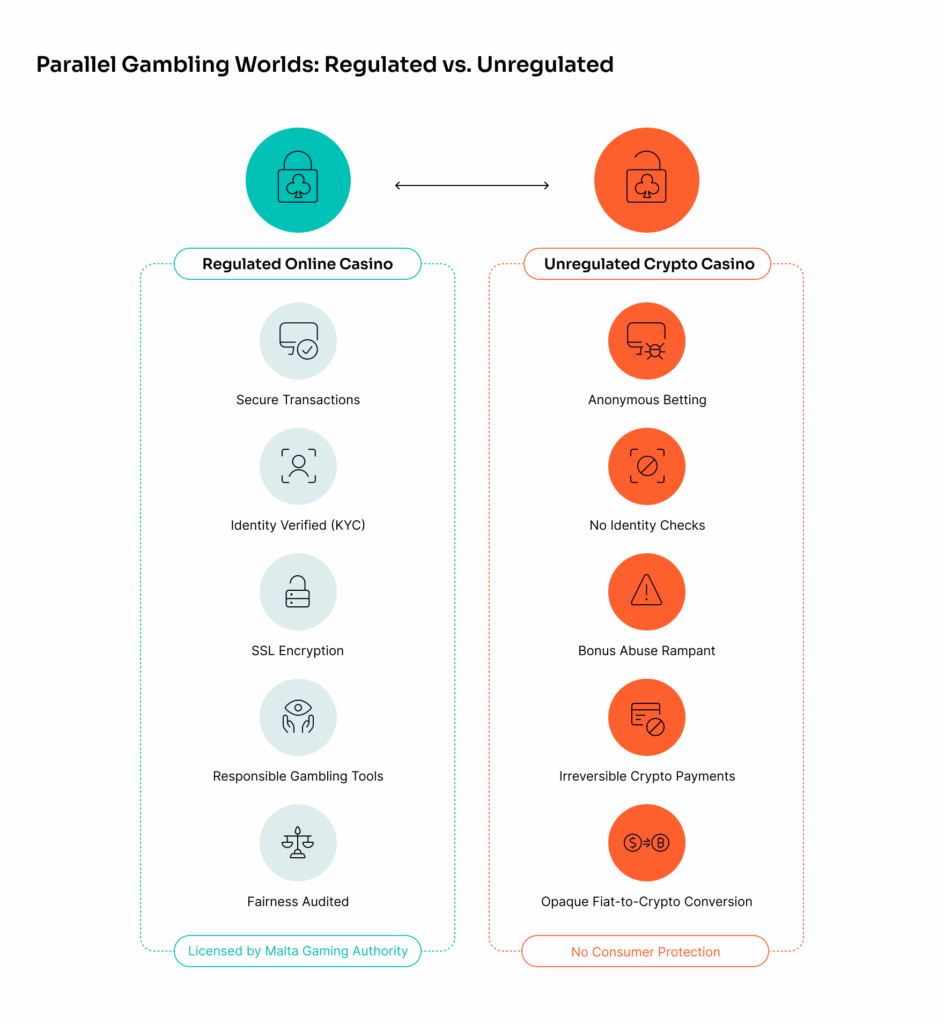A powerful and potentially dangerous new player is dominating the digital gambling scene: crypto casinos. While licensed operators are investing heavily in compliance and consumer protections, a parallel universe of unregulated crypto platforms is growing at breakneck speed — exploiting regulatory gray areas and exposing players to unprecedented risks.
This is not a niche disruption. With total bets in crypto casinos reaching $26 billion in Q1 2025 – nearly double the previous year’s volume – and the market projected to surge from $6.3 billion in 2023 to $55.3 billion by 2032 at a CAGR of 27.3%, crypto casinos now represent a systemic challenge to consumers, legitimate operators and the integrity of financial systems.
Explosive Growth, Global Reach and Regulatory Gaps
Crypto casinos transcend borders, attracting players from regions with restrictive banking systems or currency instability, such as parts of Asia, Africa and Latin America. Stablecoins now account for more than half 63% of all crypto, making these platforms especially appealing in emerging markets. This global accessibility, combined with the pseudonymous nature of digital assets, allows many crypto casinos to sidestep the rules that govern traditional online gaming.

While some leading crypto casinos now hold licenses from authorities like Curaçao or Malta and invest in security measures such as SSL encryption and two-factor authentication, the majority of platforms remain unlicensed and operate with minimal oversight. Most lack robust Know Your Customer (KYC), Anti-Money Laundering (AML) or responsible gambling obligations, creating fertile ground for regulatory arbitrage and consumer risk. For example, certain platforms may only conduct KYC with a driver’s license check when it comes to withdrawing funds in the range of $1,000-$5,000.
Conversion Shell Game
A key tactic for many unregulated crypto casinos is the seamless conversion between fiat and crypto. Players may deposit fiat, which is instantly converted to crypto for betting, masking the true origin of funds and limiting oversight from banks, regulators and even the players themselves. Winnings are often paid out in crypto, subject to opaque conversion processes, high withdrawal fees and volatile exchange rates. For many, the true cost of gambling only becomes clear after the fact.
No Rules, No Recourse
With a lack of oversight, unregulated crypto casinos create ideal conditions for online gambling fraud to thrive. Betting on events that would be illegal for licensed operators, such as elections or court cases, is common, and fraud risks are magnified in these environments. Unlike regulated operators, which rely on advanced fraud detection (device fingerprinting, behavioral biometrics, velocity checks), many crypto casinos have little incentive to protect users. There’s often no accountability or standard for fairness. And because cryptocurrency transactions are irreversible, victims of scams or theft have no chargeback or recovery path.
Playground for Bonus Abuse and Organized Fraud
Bonus abuse is a perennial challenge for legitimate gaming operators. In the crypto space, the lack of real identity verification or device tracking creates a free-for-all. Fraud rings can spin up hundreds of accounts, exploit promotions and vanish…repeating the cycle across platforms. With few reporting requirements, the scale of these losses remains largely invisible to regulators and the industry.
Consumer Confusion, Not Innovation
It’s important to note that some crypto casinos are pursuing licensing, implementing KYC/AML controls and adopting security best practices. These platforms are raising the bar for transparency and player safety, and should be distinguished from the majority that operate in the shadows.
What Needs to Happen Now
The crypto casino threat can’t be ignored. This is not just about innovation outpacing regulation; it’s about consumer protection being actively undermined.
- Regulators must clarify that gambling rules apply regardless of payment method and step up cross-border cooperation to address the decentralized nature of these operations. Monitoring fiat-to-crypto on-ramps tied to gambling is essential.
- Industry leaders, including payments providers, compliance vendors and operators, must clearly distinguish between responsible crypto gaming and rogue platforms that evade safeguards.
- Technology providers should set minimum compliance standards before supporting gambling entities…crypto or otherwise.
- Consumers need education. Innovation in payments does not remove the need for protections. If a platform isn’t licensed or transparent about how it handles funds, it shouldn’t be trusted.
Bottom Line
Crypto casinos now account for over $81.4 billion in annual revenue, reflecting a significant shift in how players engage with online gambling. These platforms aren’t just outside the system; they threaten to undermine it, preying on the unregulated edges where compliance fails and oversight is absent.
We don’t need to ban crypto in gambling. But we must close the gap between innovation and regulation. If we fail to act, we risk creating a parallel gaming economy where fraud flourishes, trust collapses, and consumers pay the price. The time to move is now, before the threat becomes the norm.
Sources
- TMCNet: Trusted Crypto Casinos 2025
- Econofact: The Rise of Stablecoins and How to Regulate Them
- Cointelegraph: Crypto casino revenue hit $81B in 2024 despite global restrictions









